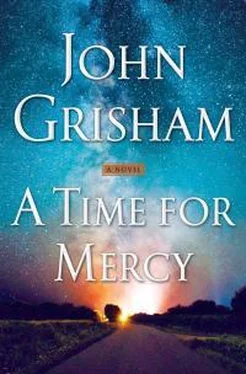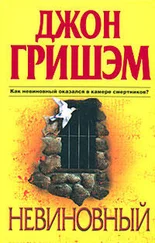“They must be stupid.”
“I didn’t say they weren’t.”
“If we start raidin’ dice and poker games we’ll have to build a new jail. Get me their names, okay, and assure them that they will not be charged.”
“I’ll try.”
“Get their names, Marshall, because you can bet that Harry Rex Vonner will have the names by tomorrow, and Jake’ll get to them first.”
Moss Junior said, “They’ve done nothin’ wrong. What’s the big deal? The only crime here is murder and we got the killer, right?”
“Nothin’ is that simple,” Ozzie said. “If this thing goes to trial you can bet your ass the defense lawyer, whoever it is, will make hay out of Kofer’s bad behavior that led to the shootin’.”
“They can’t do that,” Prather said. “He’s dead.”
“And why is he dead? Is he dead because he came home drunk and fell asleep and this stupid kid thought it would be fun to blow his brains out? No. Is he dead because his girlfriend wanted his money? No, Marshall. He’s dead because he had the bad habit of gettin’ bombed and punchin’ her around and her boy tried to protect her. This will be an ugly trial, boys, so just get ready for it. That’s why it’s imperative now that we know everything that happened. Start with Dog Hickman. Who can talk to him?”
“Swayze knows him,” Willie said.
“Okay. Get Swayze to run him down as soon as possible. And make sure these clowns know we’re not after them.”
“Got it, boss.”
—
WITH CARLA TEACHING school and spending many of her evenings preparing lesson plans and grading papers and trying to monitor Hanna’s homework, there was little time for the kitchen. The three ate dinner together most evenings at exactly seven. Jake occasionally stayed at the office until late or was out of town, but the life of a small-time practitioner did not require much time on the road. Dinner was always something quick and as healthy as possible. A lot of chicken and vegetables, baked fish, few breads or grains, and they avoided red meat and added sugar. Afterward, they hustled to clear the table and tidy up the kitchen and get on with more pleasant matters like television, reading, or playing games once Hanna had finished her homework.
On perfect nights, Jake and Carla enjoyed walks through the neighborhood, short little excursions with the doors locked and Hanna safe in her room. She refused to walk with them because being all alone in the house was such a cool move for a big girl. She would settle in with Mully the mutt and read a book as the house became quiet and still. Her parents were never more than ten minutes away.
After one of the longest Mondays in recent memory, Jake and Carla locked the doors and walked to the edge of the street where they paused by the dogwoods and enjoyed the aroma. Their home, known as the Hocutt House, was one of twenty on a shady old street eight blocks from the Clanton square. Most of the homes were owned by elderly pensioners who struggled to keep up with the ever-increasing maintenance, but a few had been reclaimed by younger families. Two doors down was a young doctor from Pakistan who at first had not been well received because no one could pronounce his name and his skin was darker, but after three years and thousands of consultations he knew more secrets than anyone in town and was widely admired. Across the street from him and his pleasant wife lived a young couple with five children and no jobs. He claimed to run the family timber business his grandfather started and handed down, but he seldom left the country club. She played golf and bridge and spent most of her time supervising the staff that was raising her brood.
Besides those two homes, though, and the Hocutt House, the rest of the street was dark, as the older folks turned in early.
Carla suddenly stopped, pulled on Jake’s hand, and said, “Hanna’s alone.”
“So?”
“You think she’s safe?”
“Of course she’s safe.”
Nonetheless, they instinctively turned around. After a few steps, Carla said, “I can’t do this again, Jake. We’ve just settled into a normal routine and I really don’t want to start worrying again.”
“There’s nothing to worry about.”
“Oh really?”
“Okay, yes, there’s something to worry about, but the threat level is low. A few strange phone calls here and there, all made by cowards who wouldn’t give their names and hid behind pay phones.”
“I think I’ve heard this before, right before they burned down our house.”
They walked a few steps, still holding hands. “Can you get rid of the case?” she asked.
“I just got it yesterday.”
“I know. I remember. And you see Judge Noose in the morning?”
“Bright and early. For motions in Smallwood. ”
“Will you talk about this case?”
“I’m sure we will. It’s the only case that’s being discussed anyway. Drew needs help right now, or at least he needs to be seen by a professional. If I get the chance I’ll ask Noose about it. And if by chance he’s found another lawyer, then I’m sure he’ll tell me.”
“But that’s unlikely?”
“Yes, it’s unlikely this soon. I’ll do the preliminary stuff, make sure the kid’s rights are protected, try to get him some help and so on, and then in a few weeks I’ll push Noose hard to find a replacement.”
“Promise.”
“Yes, I promise. You doubt me?”
“Sort of, yes.”
“Why?”
“Because you care, Jake, and I already get the sense that you’re worried about this kid and his family and you want to protect them. And if Judge Noose has a difficult time finding another lawyer, it’ll be easy for him to just lean on you again. You’ll be in place. The family will trust you. And, be honest, Jake, you enjoy being in the center of the ring.”
They turned into their narrow driveway and admired their lovely home, all safe and quiet.
Jake said, “I thought you wanted me to represent the kid.”
“I thought so too, but that was before we started getting phone calls.”
“They’re just phone calls, Carla. Nothing counts until they start shooting.”
“Well, that makes me feel better.”
—
ACCORDING TO EARL’S lawyer, the property was owned solely by Stuart, having been passed down through probate, courtesy of his grandfather who died twelve years earlier. The two ex-wives were long gone and their names had never been on the deed. Stuart fathered no known children. He died without a will, and under Mississippi law the property would be inherited by his parents, Earl and Janet, and his younger siblings, in equal shares.
After dinner Monday night, Earl and his two surviving sons, Barry and Cecil, drove to the house for the first look around since it was released by the state investigators that afternoon. It was not a visit they wanted to make, but it had to be done. When Earl parked behind Stuart’s pickup and turned off the headlights, they sat and stared at the dark house, a place they had known forever. Barry and Cecil asked if they could remain in the car. Earl said no, it was important for them to see where he died. In the rear seat, Barry tried to muffle his sobs. Finally, they got out and walked to the front door, which was not locked.
Earl braced himself and entered the bedroom first. The mattress had been stripped of its sheets and blankets, and a large, hideous stain of dried blood dominated the center of it. Earl backed into the only chair in the room and covered his eyes. Barry and Cecil stood in the door and gawked at the gruesome spot where their brother had breathed his last. There were specks of blood on the wall above the headboard and a hundred tiny divots where the technicians had removed matter for whatever was to be done with it later. The room smelled of death and evil, and a sharp pungent odor not unlike that of roadkill grew heavier the more they inhaled.
Читать дальше












![Джон Гришэм - Апелляция [Фейк]](/books/403002/dzhon-grishem-apellyaciya-fejk-thumb.webp)